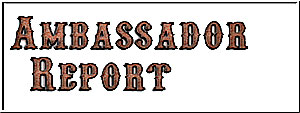
Myrmidons Meet
The annual ministerial conference of the Worldwide Church of God took place as usual in January at the church's "House of God" in Pasadena. The highlight of the conference apparently was the spectacle of Garner Ted Armstrong hugging Stanley Rader, Stanley Rader hugging Herbert Armstrong, Herbert Armstrong hugging Garner Ted Armstrong, and all three hugging each other to the standing ovation of the over one thousand assembled ministers and ministers' wives. Very touching. But what was actually accomplished at the conference? Apparently very little, except that Garner Ted further solidified his position.
As Herbert Armstrong, the founder of the Worldwide Church of God, grows more feeble, losing touch with the organization he fathered, his son is slowly consolidating his power as the new spiritual "head" of the WCG. Garner Ted Armstrong, for years known as "Playboy Ted," appears to be finally realizing the gravity of his new spiritual role in the WCG. In his younger years he resisted and tried to undo his father's strict authoritarian rules, but no more. With age comes "wisdom." He appears to have finally discerned that to retain control of his flock he must give his sheep a little room to graze while being careful not to let them think for themselves or roam at will.
Armed with this new understanding, Ted told the ministry at the January 1978 conference exactly what they must believe and teach to remain in the employ of the church. To each WCG minister Ted dispensed the "Systematic Theology Project," a 400-page packet of documents detailing the church's stance on each of its doctrines. The ministers were not asked whether they agreed with it or not, nor were they given the option of editing or revising any of its pages. They were simply told to either preach these doctrines or get out!
The presentation of the tithing doctrine was representative of the tone of the "Systematic Theology Project" and of the whole conference. In the section on tithing, one scripture after another was wrested from its context, and one weak argument followed another. But the section concluded on a dogmatic note with the statement that "the responsibility of whether and how tithing should be applied and administered today must, in the final analysis, rest solely with the Church" (p. 11). Of course, by "church" it is meant not the actual "church" but the Armstrongs. It is interesting to note that now the organization-primarily Garner Ted-is the final authority on how tithing should be applied-not the Bible. This teaching was a total about-face from the organization's May 1976 statement: "The Church policy on tithing administration is that the individual must make his own decisions in all these matters, before his God . . . rather than have the Church detail the specifics" ("Statement on Faith and Financial Responsibility," p. 2). Could it be that the organization's falling income influenced the recent change?
The "Systematic Theology Project" did have one bright spot, however. The WCG finally admitted officially that it was not a sin for its members to go to hospitals and doctors-as the last issue of Ambassador Report had challenged its leaders to admit. We were glad to see the church respond to one of the changes we urged it to make.
Still, in the long run, it is painfully evident that Ted is determined to stick with the strict, old-time religion that his father had so successfully sold for over 40 years-no matter what the Bible says. And as for those people who have been devastated by the church's erroneous doctrine on healing and other doctrinal deceptions such as "D and R" and mandatory tithing, Garner Ted has, in effect, said: "Frankly, I don't give a damn!
